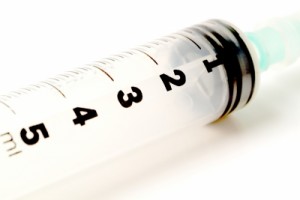Pernicious anemia can creep up on you- the seven stages of vitamin B12 deficiency begin with mild symptoms indicating low levels of vitamin B12 (cobalamin), but with time progress into debilitating, sometimes life-threatening illness, including increased risk for heart attack and stroke. Here’s what you should know about the various stages of vitamin B12 deficiency.
Stage 1- Vegan diet
Vitamin B12 occurs naturally in animal-based foods- meat, poultry, fish, eggs, and milk are all rich sources of vitamin B12. Healthy individuals who eat plenty of beef, chicken, and seafood don’t normally experience a depletion of vitamin B12, as your body stores several years’ worth of vitamin B12 in the liver.
If you follow a strict vegan diet prohibiting all meat, fish, and dairy products, then you are a high risk category for malnutrition, one of the most mild and treatable stages of vitamin B12 deficiency. Symptoms of fatigue, memory loss or foot numbness will disappear with supplementation of vitamin B12.
Stage 2- Transient Cobalamin Deficiency
This is also a mild form of vitamin B12 deficiency that requires supplementation in order to reverse symptoms. No sign of damage to the nerves or other impairment is apparent.
Vitamin B12 Deficiency Disease- Scientists find New Cause
Stage 3- Functional Cobalamin Malabsorption
There are many causes for this, one of the most common stages of vitamin B12 deficiency. Malabsorption disorder prevents your body from digesting vitamin B12 in dietary form. This is often because of damage to the stomach linings and intestines, or because of an autoimmune disorder. Certain medications and surgical procedures may also inhibit vitamin B12 absorption.
Symptoms of this stage of vitamin B12 deficiency may include:
- Extreme tiredness
- Confusion
- Memory loss
- Anxiety
- Depression
- Painful tingling and numbness in the hands and feet
- Muscle spasms
- Muscular pain or feebleness
- Eye or facial twitches
- Sore tongue
- Difficulty sleeping
For this stage of vitamin B12 deficiency, it is crucial to replenish vitamin B12 stores immediately without the use of edible cobalamin, but rather an alternate form of vitamin B12 supplement that bypasses the need for digestion.
Lifelong vitamin B12 shots, sublingual tablets, or other forms of nonedible vitamin B12 are effective at treating vitamin B12 malabsorption.
6 Degrees of Vitamin B12- B12 Deficiency and Autoimmune Disease
Stage 4- Subtle Cobalamin Deficiency
Sometimes, you have enough vitamin B12 in your total body, but not enough that are in use; when “active vitamin B12” numbers are low, and the majority of the vitamin B12 in your body resides in the liver, you begin to suffer effects of vitamin B12 deficiency, though a blood test may turn up normal.
Of all the stages of vitamin B12 deficiency, this one relies more on attention to the symptoms you’re experiencing, as opposed to blood test results. Untreated, vitamin B12 deficiency can lead to severe nerve damage, emotional disorders, and in rare cases, death.
Stage 5- Subclinical Cobalamin Deficiency
It can take some time, even years, for symptoms of vitamin B12 deficiency to develop; if you take a blood screening indicating low serum levels of vitamin B12, but you haven’t noticed any symptoms, don’t hesitate to begin vitamin B12 supplements. Until a further blood test confirms normal healthy levels of vitamin B12, you are still at risk for symptoms such as fatigue, brain fog, anxiety, depression, and muscle weakness.
Stage 6- Clinical B12 Deficiency
During these advanced, yet still treatable stages of vitamin B12 deficiency, symptoms are not yet severe enough to require hospitalization. Nerve damage which occurs at this stage can often be repaired. To stimulate healthy nerves, vitamin B12 is prescribed in large doses, usually in the form of vitamin B12 injections or other cobalamin supplementation that is absorbed into the bloodstream.
Symptoms of long-term vitamin B12 deficiency include:
- Chronic fatigue
- Severe anxiety
- Mood swings
- Deep depression
- Hallucinations
- Paranoia
- Frequent numbness or paralysis in hands and feet
- Electric shock sensations
- Vision problems
- Difficulty walking
- Poor motor skills
- Difficulty swallowing food
- Digestive problems
Stage 7- Clinically significant B12 Deficiency
This is one of the most debilitating stages of vitamin B12 deficiency. At this phase, demyelination, the breaking down of the myelin coating that protects your nerve cells is at its advanced stage. Your nerve cells are at risk of being damaged or eradicated permanently by viruses, autoimmune disorders, or inflammation.
Because vitamin B12 is essential for regulating homocysteine, a protein linked to heart attack and stroke, you may also be a high risk factor for heart disease.
If you are a pregnant or nursing mom, it is especially essential to receive immediate vitamin B12 supplementation, as your baby is also at risk for birth defects, failure to thrive, or death.
Symptoms of advanced vitamin B12 deficiency include:
- Debilitating fatigue
- Difficulty controlling arms and legs
- Inability to balance on one leg or sit upright
- Difficulty walking without stumbling
- Difficulty grasping things with your hands
- Vision impairments
- Loss of bladder control
- Heart palpitations
- Breathlessness
- Low aerobic endurance
- Hallucinations
- Paranoia
- Depression
- Anxiety
Please tell us…
Do you have any questions or suggestions? Please leave your comments below.
Share with your friends!
If you found this article helpful, then please share with your friends, family, and coworkers by email, Facebook, or Google+.
Like this? Read more:
Pernicious Anemia and B12 Deficiency- Historically Fatal, Still Formidable
9 Conditions that Mimic Fibromyalgia and Vitamin B12 Deficiency
Source:
Seven Categories of B12 Deficiency
Images courtesy of FreeDigitalPhotos.net


